Economy
States tackle NNPCL over extra N1tn subsidy payment

The Nigerian National Petroleum Company Limited has requested an additional subsidy refund of N1.19 trillion for July 2024, citing exchange rate differentials on Premium Motor Spirit importation and joint venture taxes, according to findings by The PUNCH.
But state governments tackled the national oil company over the latest request, as they raised concerns over NNPCL’s accounting practices.
These findings were based on the Federation Account Allocation Committee Postmortem Sub-Committee report for September 2024, which was obtained by The PUNCH on Monday.
The report revealed that exchange rate differentials stood at N4.56tn as of June 2024 (due to under-recovery on petrol imports between August 2023 and June 2024), but this figure increased to N5.31tn by July 2024.
The NNPCL attributed the rise to fluctuations in foreign exchange rates and unresolved subsidy payments from previous months.
The total figure adds to concerns over the fiscal impact of subsidy payments on the Federation Account.
Exchange rate fluctuations and the rising cost of importing PMS have continued to strain government revenues, raising questions about the sustainability of the partial subsidy framework.
Committee raises concerns
The FAAC Sub-Committee raised concerns over NNPCL’s accounting practices, noting discrepancies in the figures submitted.
The NNPCL’s report included N1.19tn as a balance brought forward, contributing to the overall claim of N5.31tn.
However, the Sub-Committee noted that this amount had not been included in earlier FAAC reports and was therefore not recognised in its deliberations.
The report read, “As of June 2024, the Exchange Rate Differentials stood at N4,558,597,379,030.6. This amount increased to N5,309,418,715,637.13 as of the July 2024 Federation Account.
“Note that NNPCL’s request for the application of Weighted Average Rate covers the period August to June 2024. Also, recall that all outstanding payments against NNPCL as of May 2024 were referred to the Presidential Alignment Committee for reconciliation.
“However, the Sub-Committee observed that NNPCL in their report included the sum of N1,186,540,693,485.36 as an amount brought forward totalling N5,309,418,715,637.13 in their ledger. FAAC Postmortem did not recognize the Balance Brought Forward because it was not included in the FAAC report earlier submitted.”
During the September meeting with agencies, the NNPCL informed the FAAC Postmortem Sub-Committee that the N1.19tn figure was an actual under-recovery amount, which included adjustments for June and July 2024.
This amount, the NNPCL said, was used as the opening balance in its report.
In response, the Sub-Committee recommended that the NNPCL re-submit the figure for consideration at the next plenary.
The report noted, “During the monthly reconditioning meeting with Agencies, NNPCL informed the meeting that the amount submitted to the Presidential Alignment Committee for under-recovery was estimated. The actual under-recovery of N1,186,540,693,485.36, including June and July 2024, resulted in the opening balance in the NNPCL report.
“The Sub-Committee resolved that since NNPCL’s earlier report to FAAC did not include the sum of N1,186,540,693,485.36 brought forward, NNPCL should re-submit the amount for FAAC Plenary noting.”
Missing documentation
Further scrutiny of the NNPCL’s claims revealed additional issues. Minutes of a previous FAAC meeting indicated that as of June 2024, the NNPCL had reported an outstanding claim of N4.34tn against the Federation.
The claim, which was tied to exchange rate differentials, lacked essential details, including the volume of PMS imported, pricing, and sales values.
The Federal Commissioner of the Revenue Mobilisation, Allocation, and Fiscal Commission stated that the omission of these details made it difficult for the Sub-Committee to justify the figures submitted.
Consequently, the sub-committee directed the NNPCL to provide all relevant information to enable further assessment of its claims.
The FAAC Postmortem Sub-Committee has emphasised the need for transparency and accountability in subsidy-related reporting.
It noted that the discrepancies in the NNPCL’s submissions had delayed the reconciliation process, which had already been referred to the Presidential Alignment Committee.
The sub-committee also urged the NNPCL to ensure the inclusion of all outstanding amounts and a comprehensive breakdown of its PMS importation records in future reports.
The minutes for one of the FAAC meetings, which was seen by The PUNCH, noted, “The Federal Commissioner, RMAFC, informed the meeting that NNPC Limited reported to the Sub-committee that it had an outstanding claim of N4,344,519,176,167.32 against the Federation as a result of exchange rate differentials as at June 2024.
“He stated that the Sub-committee observed that the details of the PMS volume, price, and sales value were not provided in the June 2024 Report of NNPC Limited to justify the exchange rate differentials recorded. He concluded that the Sub-committee had resolved to request NNPC Ltd to provide the relevant information for further consideration.”
The PUNCH earlier reported that Nigerian National Petroleum Company Limited demanded a refund of N4.71tn from the Federal Government to settle outstanding debts used to import Premium Motor Spirit, popularly called petrol, into the country.
However, the NNPCL clarified that the N4.71tn was just an estimate, and the actual figure was N4.34tn, which increased to N5.31tn by July 2024.
This development means that the government has been supporting fuel imports by covering the difference between the projected rate and the actual expenses incurred by the NNPCL for importing petroleum products into the country.
This difference in cost, which ordinarily should be reflected in the retail price of the product and borne by final consumers, contradicts the government’s claims that subsidies have been eliminated.
This revelation also comes amid challenges faced by the petroleum company to ensure the adequate supply of PMS to marketers for distribution nationwide.
On May 29, 2023, during his inauguration, President Bola Tinubu publicly declared that “subsidy is gone,” signalling the end of barriers that had been restricting the nation’s economic growth.
However, this claim has been contested by the International Monetary Fund, the World Bank, and other authoritative figures, who argue that the government had quietly reintroduced fuel subsidies.
In June, a proposed economic stabilisation plan document stated that the government planned to spend about N5.4tn on fuel subsidies.
The N5.31tn demanded by the NNPCL for petrol under-recovery is about 98.33% of what the Federal Government had planned to spend on fuel subsidies this year.
Between January and June 2023, the Federal Government spent about N3.6tn on fuel subsidy, which was far more than the N2tn spent for the entire year of 2022.
In the approved Medium-Term Expenditure Framework, the Federal Government admitted that the petrol subsidies have remained a major challenge.
It noted that the final 2023 dividend for the Federal Government from the NNPCL was withheld to settle fuel subsidies.
The MTEF document noted, “Despite recent reforms, petrol subsidies continue to have a significant adverse impact on oil revenues. Recently, the 2023 final dividend due to the federation was withheld for payment of fuel subsidies.”
Amidst the increasing cost burden on the government for petrol under-recovery, and despite promising to bring down the price of petrol during his campaign, President Bola Tinubu has repeatedly increased petrol price by about 505.71 per cent – from N175 in May 2023 to N1,060 in October 2024 – inflicting more pains on the already impoverished Nigerians.
Credit: PUNCH
Economy
Inflation surged to 24.23% due to escalating cost of living
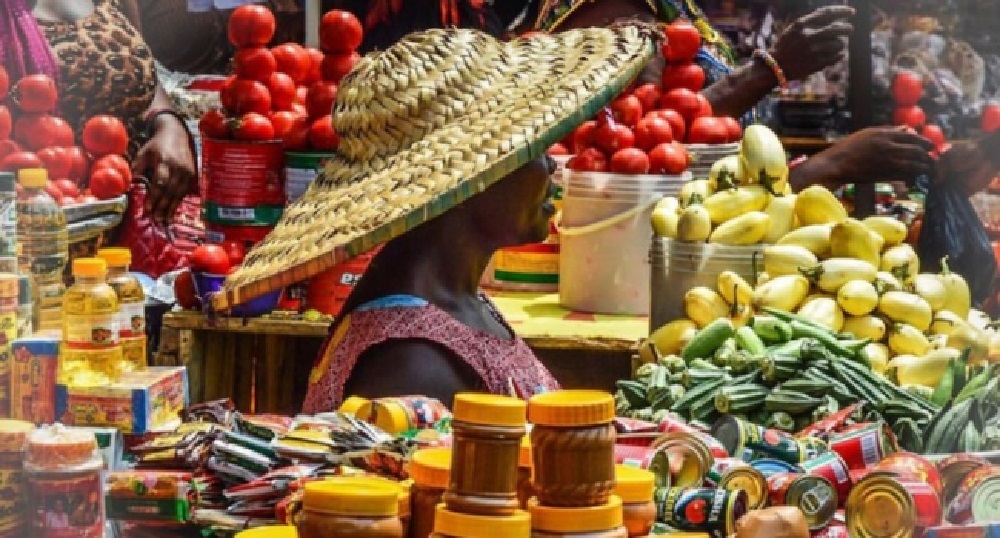
Inflationary pressure has reappeared as Nigerians grapple with increases in average costs of basic food items and energy.
For the first time after the rebasing of the Consumer Price Index (CPI), headline inflation spiked in March to 24.23 per cent – 105 basis points above the 23.18 per cent recorded in the previous month.
The National Bureau of Statistics (NBS) yesterday indicated that the rate of increase in the average price level was higher in March than the level in February.
In January, the NBS updated the weight and price reference periods in calculation of the CPI to make the inflationary gauge more reflective of changes in consumption patterns and the economy generally.
The rebasing did not only brought the base year closer to the current period from 2009 to 2024, it also introduced some critical methodology changes to improve the computation processes.
After the rebasing, inflation dropped from 34.80 per cent in the pre-rebased period of December 2024 to 24.48 per cent in January 2025. It dropped further to 23.18 per cent in February.
In its latest report, NBS recorded 186 basis points changes between the monthly inflation rate, with the month-on-month rate rising from 2.04 per cent in February to 3.90 per cent in March.
The NBS attributed the spike to the rise in costs of food and alcoholic beverages, fuels and electricity, among other items.
Analysts at CardinalStone said the resurgence was due to renewed foreign exchange (forex) pressures amid heightened global risk-off sentiment.
They pointed at foreign portfolio investments (FPIs) outflows and increased dollar demand, which saw naira dropping by 2.4 per cent in March.
Experts also cited increase in price of Premium Motor Spirit (PMS) or petrol, following the temporary suspension of the naira-for-crude swap arrangement.
Food inflation rate stood at 21.79 per cent in March 2025. The composite food index decreased to 21.79 per cent from 23.51 per cent.
Core inflation, which excludes volatile agricultural produce prices and energy, rose to 24.43 per cent from 23.01 per cent.
Specifically, the month-on-month food inflation rose by 50 basis points from 1.67 per cent in February to 2.18 per cent in March.
The NBS attributed the increase in food inflation to increases in the average prices of basic food items including ginger, garri, broken rice, honey, crabs, potatoes, plantain flour, periwinkle and pepper amongst others.
On a state-by-state basis, food inflation was higher in Oyo with 34.41 per cent; Kaduna (31.14 per cent) and Kebbi (30.85 per cent).
On the other side, the 9.61 per cent recorded by Bayelsa; Adamawa (12.41 per cent) and Akwa Ibom (12.60 per cent), were the lowest inflation rates.
Analysts expressed concerns that the resurgent inflationary pressure might lead to renewed tightening stance by the Central Bank of Nigeria (CBN).
CBN Governor Dr. Olayemi Cardoso, had at the end of the first Monetary Policy Committee (MPC) meeting in 2025, reiterated the apex bank’s commitment to orthodox monetary policies, noting that the apex bank’s stance will be reflective of the inflationary trend.
With inflation rate dropping in February, the MPC had decided to maintain all key monetary policy parameters, including the Monetary Policy Rate (MPR) at 27.50 per cent, the asymmetric corridor around the MPR at +500/-100 basis points, the Cash Reserve Ratio (CRR) at 50.00 per cent for Deposit Money Banks and 16.00 per cent for Merchant Banks, and the Liquidity Ratio at 30.00 per cent.
Clarifying the impact of the rebased CPI, Cardoso had explained that the lower inflation figure should not be misinterpreted.
He underlined the need to analyse more data before drawing comparisons, noting that the CBN is currently assessing the figures and will provide further guidance in due course.
The CBN boss stressed the critical importance of collaboration between monetary and fiscal authorities in sustaining recent economic improvements.
Addressing concerns about the impact of elevated borrowing costs on economic growth, the CBN governor assured that the apex bank’s primary objective is to stabilize the foreign exchange and financial markets.
He expressed confidence that such stability would attract increased foreign investments, stimulating the much-needed economic growth.
Cardoso also highlighted the competitiveness of the Nigerian currency, which has spurred growing interest from international investors.
Economy
SEE Current Black Market Dollar (USD) To Naira (NGN) Exchange Rate

The exchange rate between the US dollar and the Nigerian naira continues to draw significant attention from individuals and businesses alike, especially those involved in international trade and remittances.
On Saturday, April 12, 2025, activity in the Lagos parallel market, commonly known as the black market shows that the buying rate for one US dollar stands at ₦1570, while the selling rate is ₦1575.
These figures are sourced from traders and Bureau De Change (BDC) operators who are active in key currency exchange hubs across Lagos.
Why the Black Market Rate Matters
Although the Central Bank of Nigeria (CBN) does not officially recognize or support the use of the black market for foreign exchange transactions, many Nigerians still rely on it due to difficulties in accessing forex through official banking channels. Issues such as limited availability, long processing times, and strict documentation requirements have made the black market a more accessible, albeit riskier, alternative.
CBN’s Official Position
The CBN continues to warn against participating in parallel market trading, stating that such activities undermine the stability of the national currency. The apex bank urges those in need of foreign currency to apply through authorized financial institutions, which are mandated to follow official exchange rates.
Nonetheless, the disparity between the official and unofficial markets persists, often influenced by market forces such as demand, inflation, and fluctuations in Nigeria’s foreign reserves.
Latest Exchange Rates Overview
Black Market (Parallel Market) Rate
Currency Pair Buying Rate Selling Rate
USD/NGN ₦1570 ₦1575
CBN Official Rate
Currency Pair Highest Rate Lowest Rate
USD/NGN ₦1630 ₦1570
Key Notes for Forex Users
The exchange rates in the black market often differ slightly from one location or dealer to another due to market volatility and negotiation margins.
Rates can also fluctuate within hours based on economic news, government policies, and global financial trends.
It is advisable to compare rates from multiple sources before conducting any large transactions, especially in volatile markets.
What This Means for Nigerians
The current forex rates reflect continued pressure on the naira, and many analysts believe that inflation, reduced oil revenue, and inconsistent monetary policies are key factors driving the demand for the dollar. For everyday Nigerians, this means the cost of imported goods remains high, and businesses dependent on international suppliers face growing challenges.
Until forex supply stabilizes through official channels, the black market will likely remain a major player in Nigeria’s currency landscape.
Economy
CHECK Exchange Rate As Naira Weakens More In Parallel Market

Naira has continued its downward slide in the parallel market on Thursday, exchanging at N1,621/$1, a depreciation from N1,580/$1 recorded just a day earlier on Wednesday.
This represents a N41 decline in 24 hours, deepening concerns among traders and economic watchers about sustained volatility in the FX market.
While the official exchange rate stood at N1,644.00/$1 on Wednesday, according to figures published on the Central Bank of Nigeria (CBN) website, there was no updated official rate published by the CBN several hours after the market close on Thursday.
Meanwhile, market participants at Wuse Zone 4 in Abuja attributed the persistent depreciation to a resurgence in speculative activities, unmet demand from importers, and lingering confidence issues in the foreign exchange market.
Alhaji Aminu Gwadabe, President of the Association of Bureau De Change Operators of Nigeria (ABCON), attributed the ongoing volatility in the forex market to a mix of local and global uncertainties. In a message sent to Nairametrics, he stated:
“The volatility, fears, happenings, and shocks in both the local and international markets called for disdain.
President Trump’s tariff announcements have sent markets into panic, loss of confidence, revenue losses, and budget reviews.”
He added that despite ongoing interventions by the CBN, instability persists.
“As usual, the CBN, being a catalytic actor, must continue to ensure stability through timely interventions. However, volatility remains a challenge and needs to be more comprehensively addressed,” Gwadabe said.
He further called for an expanded policy transmission mechanism to better serve the retail end of the FX market.
“It is therefore necessary for the CBN to reevaluate the efficacy of that Policy transmission mechanisms and expand its scope to the BDCs retail segment of the market to cater for the needs of the critical retail needs of invisible transactions where the BDCs pose the most potent tool of the CBN policy transmission mechanism.”
Dr. Muda Yusuf, CEO of the Centre for the Promotion of Private Enterprise (CPPE), also linked the naira’s recent struggles to global developments and speculative pressures.
“This is not unconnected to recent policy signals from President Trump and global oil price movements. The market is heavily information-driven, and speculative pressure has spiked following the tariff announcements,” Yusuf explained.
“Now that Trump appears to be having second thoughts, we might even see a bit of a breather in the FX market,” he added.
Meanwhile, traders on the ground say the situation is being worsened by the uncertainty surrounding ongoing government reforms and inconsistent access to official FX windows.
“The demand today was unusually high, especially from small businesses that can’t access the banks. It’s putting pressure on our supply,” a trader at Abuja’s Wuse Zone 4, who asked not to be named stated.
The spread between the official exchange rate of N1,644/$1 and the parallel market rate of N1,621/$1 narrowed slightly on Thursday, a sign that some convergence may be taking place, despite persistent volatility.
Market analysts warn that unless the CBN resumes consistent interventions or significantly boosts FX liquidity, the naira may continue to face downward pressure in the weeks ahead
The continued slide of the naira, despite heightened CBN interventions, signals persistent challenges in Nigeria’s FX liquidity and structural demand-supply mismatch.
-
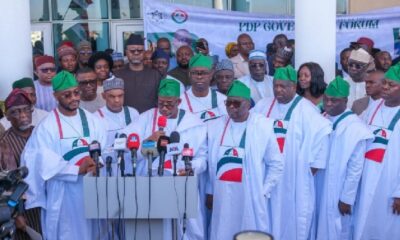
 News21 hours ago
News21 hours agoPDP governors declare support for Tinubu
-

 News22 hours ago
News22 hours agoHope for Nigerians as Dangote refinery slashes petrol price again
-

 News22 hours ago
News22 hours agoRivers Emergency Rule: Abbas inaugurates 21-member panel
-

 News21 hours ago
News21 hours agoN1.3trn CBEX Scam: EFCC caution Nigerians against Ponzi Schemes
-
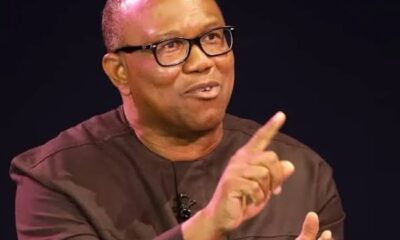
 News24 hours ago
News24 hours agoPeter Obi asks president Tinubu to suspend France trip
-

 News8 hours ago
News8 hours agoFG expresses sympathy for CBEX victims, urges a united effort to combat Ponzi schemes
-
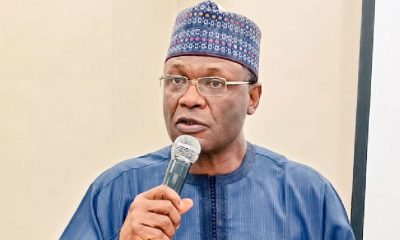
 News24 hours ago
News24 hours agoINEC chair, Yakubu calls on African youths to promote peaceful elections
-
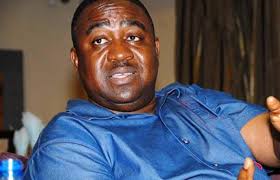
 News21 hours ago
News21 hours agoSuswan kicks as PDP governors reject merger talks

















